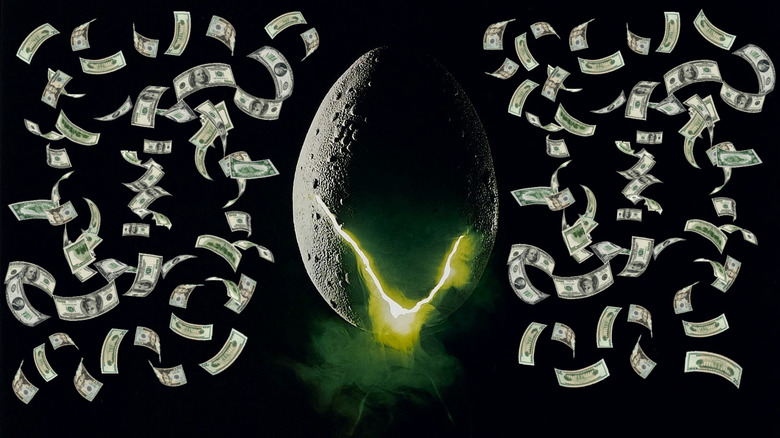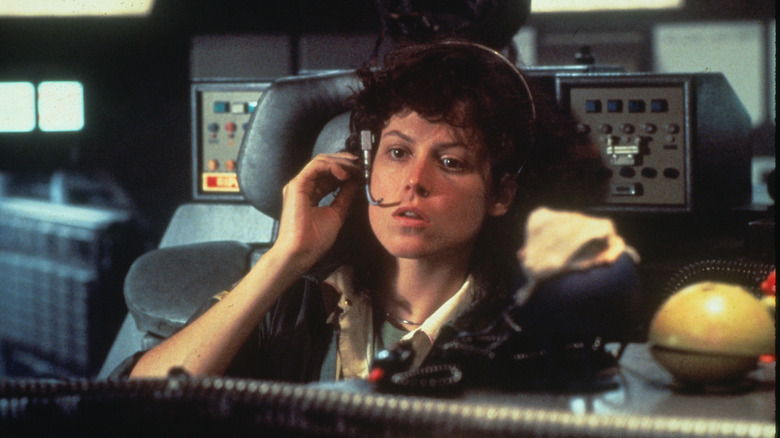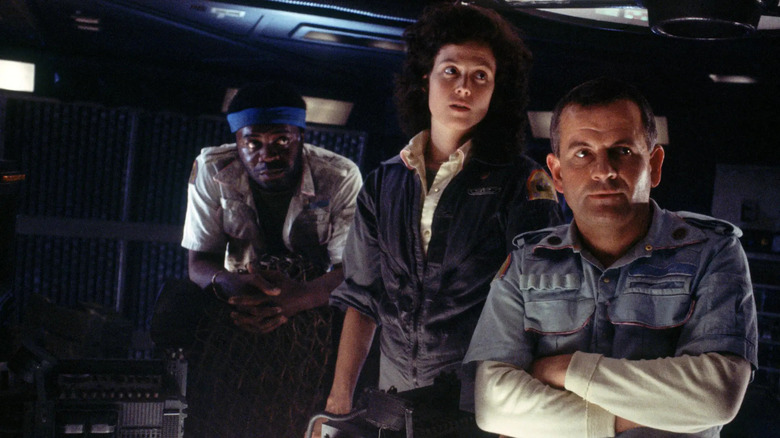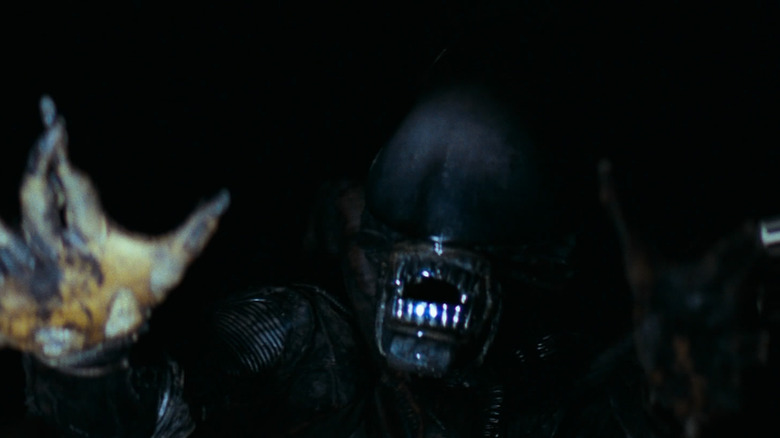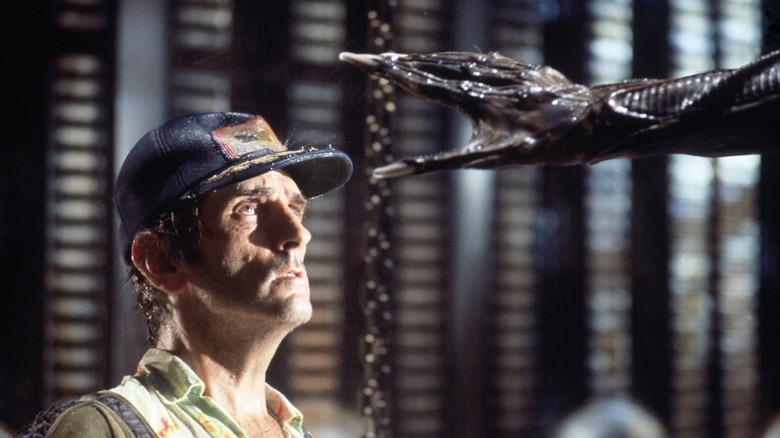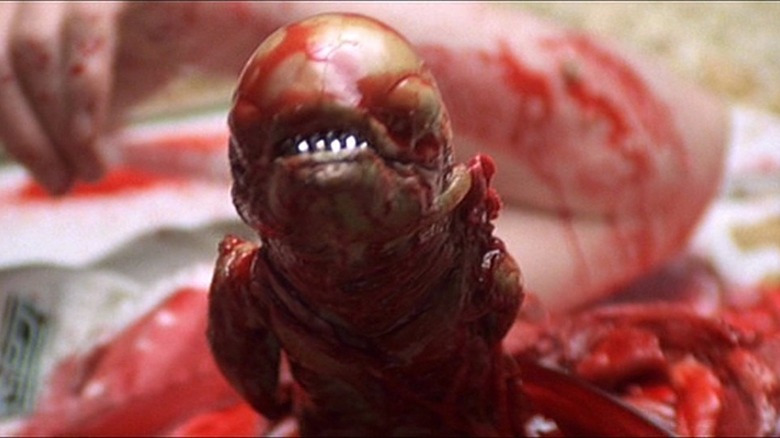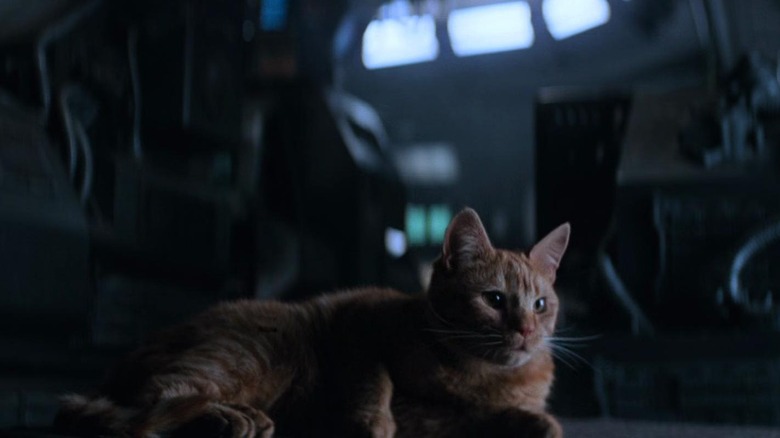45 Years Ago, Alien Became One Of The Most Important Box Office Hits In History
(Welcome to Tales from the Box Office, our column that examines box office miracles, disasters, and everything in between, as well as what we can learn from them.)
"In space, no one can hear you scream." Few cinematic taglines have managed to become as immediately identifiable as this one. While it needs no introduction, the tagline was attached to director Ridley Scott's seminal 1979 classic, "Alien." Regardless of genre, it is one of the most highly regarded and influential films ever made. It was also, not for nothing, a huge hit in its day, only to become an even bigger hit as the years have rolled on. Put plainly, it's one of the most important box office success stories in history.
"I thought it was a small movie," said Sigourney Weaver, the film's lead, in an interview with Reuters in 2019. "It had a tiny cast and a brilliant young director." Scott, already in his 40s, wasn't all that young, as directors go. He was brilliant, though, as the world would soon discover when his sci-fi/horror masterpiece was unleashed upon the world.
In this week's Tales from the Box Office, we're looking back at "Alien" in honor of its 45th anniversary this week. We'll go over how "Star Wars" influenced the film's direction, how H.R. Giger crafted the now-iconic Xenomorph, what happened when it hit theaters, the vast sphere of influence it had on cinema, and what lessons we can learn from it in the modern context. Let's dig in, shall we?
The movie: Alien
As is usually the case, the story of "Alien" begins with the script. The script in question was written primarily by Dan O'Bannon ("Dark Star"), who cooked up the story alongside Ronald Shusett. The script went through many, many revisions before making its way to the screen. Speaking with the blog Strange Shapes in 2014, O'Bannon explained the complex script process that, ultimately, led to him getting sole credit on the finished film:
"David Giler, who is one of the producers, sat down and just kept rewriting it all. Just kept rewriting and rewriting it, and rewriting it, until there was very little resemblance to the original screenplay. I wasn't allowed to participate in that because he didn't want me to...Then two weeks before we started shooting, he left for mysterious reasons...The main producer, Gordon Carroll, and the director called me in and there were two weeks of frantic mutual work between all of us trying to put the script into shape. By the time we got done, it was maybe 80 percent of what the original draft was."
As for Scott, he was coming off of his feature film debut "The Duelists" and was offered the chance to direct "Alien" by the producers. This was around the time that "Star Wars" had become one of the biggest films in history, so sci-fi was a hot item. Be that as it may, Scott had no interest in crafting a riff on what George Lucas had done. He actually wanted to make the "antithesis" of "Star Wars," as he explained in 2019. Instead, he took inspiration from French artists to craft his crew of doomed space explorers who come face-to-face with the most terrifying being in the cosmos:
"I was absolutely knocked out by [French artist] Moebius. And I thought, 'I'm going to apply Moebius to this film and that's the way to go,' because the screenplay didn't rely on characters, but in fact relied on a monster."
Casting the crew of the Nostromo
The film centers on the crew of a massive commercial space vehicle named the Nostromo that is en route to Earth with a payload of extraterrestrial ore. They are sidetracked by mysterious signals from a nearby planet, which seem to be calls for help. When the ship arrives, the crew finds a ruined spacecraft with egg-shaped, living organisms inside. As they soon discover, these eggs contain the ingredients to create the most horrifying beings imaginable.
Because the cast was relatively small, every choice mattered a great deal. Scott, in his own words, drove the casting team "crazy" trying to find the right people to fill out the ensemble. While Meryl Streep and others were considered for the role of Ripley, it ended up going to a relative unknown, Sigourney Weaver. We have silver screen legend Warren Beatty to thank for that. As Scott once explained:
"Warren Beatty had called up David Giler and said, 'Listen, I've seen this young woman onstage off-Broadway called Sigourney Weaver, you should see her.' I believe that's what happened. Because then the next thing is I'm going to meet Sigourney and in walks somebody who's got to be at least six foot one and dwarfed me."
The rest of the ensemble was filled out with sturdy character actors such as Tom Skerritt (Dallas), John Hurt (Kane), Harry Dean Stanton (Brett), Veronica Cartwright (Lambert), Yaphet Kotto (Parker), and Ian Holm (Ash). Perhaps more than any member of the cast, it was bringing artist H.R. Giger aboard to craft the look of the film that helped make "Alien" what it is.
Crafting the Xenomorph and the look of Alien
Getting the studio to sign off on Giger took some convincing, as Fox executives were worried his work was "obscene." Fortunately, Scott convinced them that was just what they needed.
"When I was going to do 'Alien' I had seen a book called 'Necronomicon' and it had a marvelous picture in it, which in effect was the Alien. Fox weren't sure about it at the time and they said it was obscene and dark and I said, 'obscene and dark is good, we are about to do a horror movie, dude.'"
Giger, though not known for his work in film, was remarkably accomplished by the late '70s. He had exhibited his art all over the world, had multiple books to his name, and even designed several album covers. His "obscene" gothic style proved to be the perfect fit for Scott's dark space adventure. Most importantly, Giger is responsible for the film's deadly extraterrestrial, the Xenomorph. In a 2014 Express piece published around his passing, the artist was quoted as saying the following about his creation:
"It is elegant, fast and terrible. It exists to destroy and destroys to exist...Once seen it will never be forgotten. It will remain with people who have seen it, perhaps in their dreams or nightmares, for a long, long time. Perhaps for all time."
A bold claim, sure, but it would be hard to argue, with the benefit of hindsight, that he's wrong. Giger's macabre ways permeated the set, with the artist getting real bones delivered to the set to help craft the film's look. "They had been to medical supply houses, slaughterhouses, and God knows where else, and the next day the studio was full of bones and skeletons of every possible description," an anonymous source once recalled. "You'd go into Giger's studio and you'd see this guy looking like Count Dracula, dressed all in black leather, with his black hair, lily-white skin and blazing eyes."
The financial journey
In the end, Giger helped Scott craft something wholly unique. The filming process was brutal, with the cast passing out on set due to the suffocating space suits. The film also originally had a much darker, more bizarre ending that, thankfully, didn't make it into the final cut. As it exists, Ripley stands alone as one of the coolest final girls in the history of horror. It's has a crowd-pleasing ending, and it worked like gangbusters for audiences in the summer of '79.
Fox released "Alien" initially on May 25, 1979. The studio decided to play it slow, with the film playing on just 91 screens across the U.S. on Memorial Day weekend. From the jump, it was a smash success, pulling in $3.5 million on opening weekend, resulting in a per-screen average close to $39,000. While box office records from this period are not as well-kept, it is believed this may have been the biggest per-screen average in history up to that point.
Thus started the slow roll, with Fox adding screens and making more prints of Scott's R-rated, sci-fi/horror crowd-pleaser to meet growing demand. Even as other big movies such as "Rocky II," "Moonraker," and "The Amityville Horror" arrived that summer as more traditionally safe bets, "Alien" endured.
In its original run, "Alien" finished with a stellar $78.9 million domestically. Given the film's reported $11 million budget, this was seemingly an excellent return on investment for Fox (more on that in a moment). Over the years, through its various re-releases, Scott's now-heralded classic has pulled in a grand total of $186.9 million globally. It's also responsible for starting a franchise that is still going strong to this day, with "Alien: Romulus" hitting theaters in August. To date, the films have collectively grossed $1.67 billion (and counting).
The vast influence of Alien
Even though Scott's film didn't get a sequel until James Cameron's equally heralded "Aliens" came along in 1986, the influence was felt quickly and remains strong to this day. Legendary filmmaker Stanley Kubrick ("2001: A Space Odyssey") even phoned up Scott to get some insight into how he pulled off the legendary chest-burster scene. As Scott recalled in 2023:
"The first time I talked to Kubrick was a week after 'Alien' came out. Somebody said, 'Stanley Kubrick is on the line.' I said, 'Hello?' 'Hello. Stanley Kubrick here. How are you? I just saw 'Alien." Straight in. 'How on earth did you get that thing coming out of his chest? Because I've got a print, and I've run it on the machine, and I can't see the cut.' So I said, 'Well, I had John Hurt cut a hole in the table, lie in a horrible, awkward position, and I made a fiberglass shell ...' He said, 'I got it, I got it, I got it. Brilliant.'"
"Alien" also garnered acclaim in its day, going on to win the Oscar for best visual effects. In 2002, it was added to the National Film Registry for its cultural significance. Remarkably, Fox tried to claim that the movie hadn't turned a profit for years, even though those clever accounting practices didn't hold weight forever. That's why they're still making "Alien" movies now, as the successes far outweigh the misses, with Scott's "Alien: Covenant" in 2017 ranking as arguably the franchise's only financial misfire. But that film has also developed a loyal following in the years since its release, and on a long enough timeline, it too will probably be considered a successful experiment.
More than anything, the number of filmmakers and films that have been directly influenced by "Alien" are too numerous to count. Well beyond the franchise itself, the shadow this movie casts is vast and enduring. Few directorial efforts in cinema history can claim to be both this commercially successful in addition to being so well respected. It's rare air.
The lessons contained within
It feels a little silly to try and say something profound about "Alien" at this point. The film's legacy is so firmly cemented, and so much has been written about its brilliance over the years, that it sometimes feels like there is no more that can be said. Sometimes, there is no real substitute for genius. Lightning in a bottle is a hell of a thing. Then again, Scott has also directed the likes of "Gladiator" and "Blade Runner," among many other masterpieces, so we can't pretend this was some kind of accident, either.
For horror, this remains one of the touchstone pictures that helps provide legitimacy to a genre that is still — for some stupid reason — fighting for it. Right up there with "The Exorcist," "The Silence of the Lambs," and Jordan Peele's "Get Out," this is one of the movies that even the snobbiest of film snobs cannot deny, even if it's in the horror space. The "Alien" franchise even won /Film's Tournament of Terror a couple of years back. (Hey, that's a high honor!)
If anything about this film resonates today, it's that 45 years later, horror still feels like an underdog genre somehow. In reflecting upon the brilliance that this genre is capable of delivering, I leave you with the words of the late, great Roger Ebert, who had some nice things to say about "Alien" in 2003:
"One of the great strengths of 'Alien' is its pacing. It takes its time. It waits...A recent version of this story would have hurtled toward the part where the alien jumps on the crew members. Today's slasher movies, in the sci-fi genre and elsewhere, are all pay-off and no buildup...It isn't the slashing that we enjoy. It's the waiting for the slashing."
